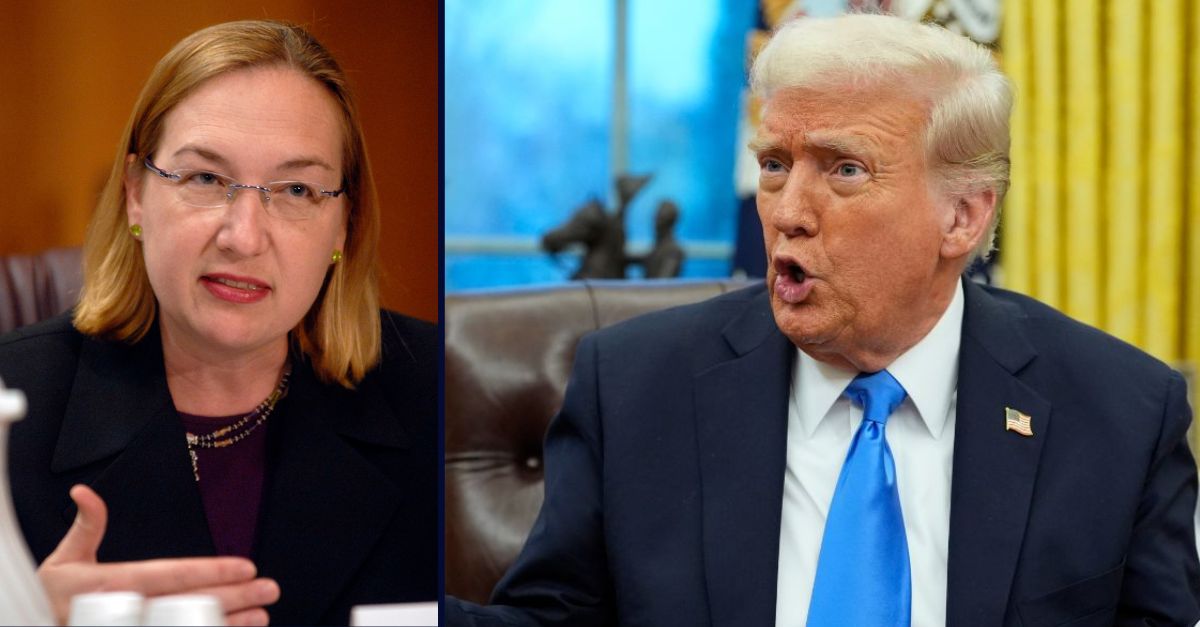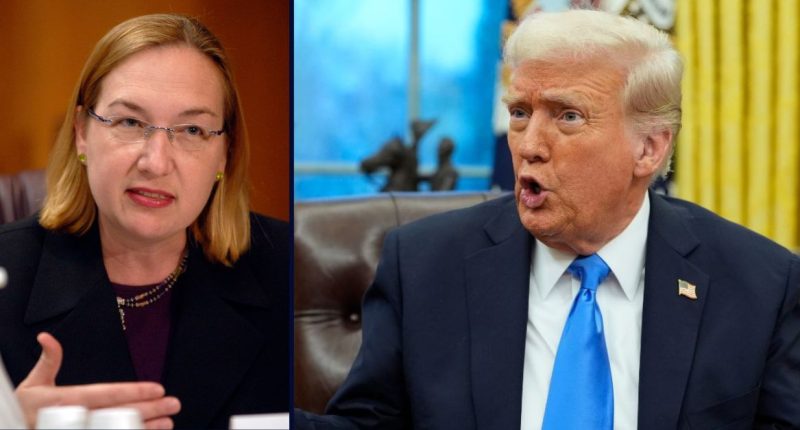
Left: FILE – In this Dec. 11, 2007 file photo, Commissioner Beryl A. Howell, speaks during the U.S. Sentencing Commission meeting in Washington (AP Photo/Stephen J. Boitano, File). Right: President Donald Trump speaks with reporters in the Oval Office at the White House, Tuesday, Feb. 11, 2025, in Washington (AP Photo/Alex Brandon).
President Donald Trump’s Justice Department got peppered with questions and condemnations Wednesday in federal court over its targeting of the Hillary Clinton-linked law firm Perkins Coie in an executive order last month — allegedly as retaliation for its representation of perceived “political enemies” — with the judge and plaintiffs criticizing what they called the government’s “national insecurity” concerns and “temper tantrum” behavior “worthy of a 3-year-old.”
U.S. District Judge Beryl Howell and one of the attorneys representing Perkins Coie, Dane Butswinkas, took turns during a morning hearing confronting the Trump administration for its claims that the law firm was the subject of an executive order in March — accusing the firm of “undermining democratic elections” and engaging in racial discrimination — due to matters related to “election integrity, national security, and discriminatory employment practices.”
At one point, Howell — who had temporarily blocked the executive order in a March 13 ruling — related the government’s actions to that of a toddler in reference to a March 20 memo issued by the U.S. Office of Management and Budget that described Howell’s directives and orders in the case as “erroneous,” while Trump’s EO was said to be legally “permissible.”
“This March 20 memo contained some extra text that was not included in the original compliance memo,” Howell said Wednesday.
“I’ll be honest, it struck me as a temper tantrum from the Department of Justice and OMB,” the judge charged. “Would that be an incorrect impression, if you can’t explain any other purpose for the language? Worthy of a 3-year-old — not at the Department of Justice and OMB.”
Howell questioned DOJ Deputy Associate Attorney General Richard Lawson on Wednesday about the government’s motivations in going after Perkins Coie.
“The purpose was not to force Perkins to its knees to come up with more to reach the $1 billion goal of a free legal fund?” Howell asked.
“I don’t view it that way, your honor,” Lawson replied. “I view these concerns … as significant.”
The question of whether “national security” was really one of the biggest concerns in the Perkins case, when the EO specifically states that the decision to go after the law firm was “pending a review of whether such clearances are consistent with the national interest,” not national security, was brought up repeatedly Wednesday.
“It sounds more like national insecurity, than national security,” Butswinkas, the attorney for Perkins Coie, told the judge.
Lawson, meanwhile, said that when it comes to national security clearances, “an essential factor is trust in the holder” and the president is allowed to distance the government from people or entities that he does not trust, per Lawson.
“And $40 million with free legal services is enough to have the president trust Paul Weiss again?” Howell asked the DOJ lawyer, in an apparent reference to the law firm Paul Weiss — a firm linked to former special prosecutor Robert Mueller that was also targeted by an executive order — reaching a deal with the White House that included a pledge of $40 million in free legal work to “support the Administration’s initiatives.”
“This is why I would urge great caution in relying on news reports and press releases,” Lawson responded.
Howell replied by saying she was “looking at facts” in the case.
Howell compared the government’s decision to go after Perkins Coie before investigating its individual employees as “putting the cart before the horse,” which Lawson and the DOJ denied. The judge noted that no evidence has been presented to support the administration’s claims against the firm.
“That is what happened during the Red Scare, that is what happened during the McCarthy ere,” Howell told Lawson.
While being questioned later by the judge, Butswinkas said: “You referenced Red Scare and McCarthy. This is exactly that. … It’s worse than that, because it’s even more punitive. This is exactly the kind of conduct the constitution forbids, and they can’t dress it up and claim that it’s national security without some record for you.”
Perkins Coie sued the Trump administration in March over Trump’s March 6 executive order entitled “Addressing Risks From Perkins Coie LLP,” in which he accused the firm of “undermining democratic elections” and engaging in racially discriminatory hiring practices. The order also suspended security clearances for Perkins Coie employees, barred them from accessing government buildings, and terminated any contracts the firm may have with the government.
The firm filed its lawsuit the following week, alleging in its 43-page complaint that the order was unconstitutional.
“The Order is an affront to the Constitution and our adversarial system of justice,” the complaint states. “Its plain purpose is to bully those who advocate points of view that the President perceives as adverse to the views of his Administration, whether those views are presented on behalf of paying or pro bono clients.”
The complaint also accuses the administration of violating the separation of powers by effectively deciding that the firm had engaged in “misconduct,” then imposing punishments “ex post facto” without giving Perkins Coie or its employees the chance to contest the “false and disparaging claims” made against them.
The Trump administration responded with a motion to dismiss, saying the conduct of Perkins Coie and its employees is the reason the president issued the order. The administration also claimed that it is within Trump’s authority to issue the order while also rejecting the assertion that Trump was following through on threats to go after his political enemies and those he believes work against his agenda. Lawyers for the administration further argued that siding with Perkins Coie in the matter would set a dangerous precedent of silencing the president.
“Plaintiff’s lawsuit carries with it a dangerous risk of muzzling the Executive,” the motion to dismiss stated. “No less than Plaintiff, the government has a right to speak.”
Trump has used executive orders to target numerous law firms since taking office that have employed individuals involved in investigating his alleged criminal conduct as well as firms that have represented clients suing his administration. Some, including the law firms of Jenner & Block and WilmerHale, in addition to Perkins Coie, have fought the president in court while others moved quickly to strike a deal with the administration for pro bono work to bolster Trump’s political agenda.
Last month, Willkie Farr & Gallagher agreed to cut its DEI programs and to provide the Trump administration with at least $100 million in free legal services in exchange for the president withdrawing a similar executive order targeting the firm. Similar agreements were reached in March with the law firms Paul, Weiss and Skadden Arps.
In addition to Perkins Coie, the law firms Jenner & Block and WilmerHale have also sued the administration over executive orders.
Love true crime? Sign up for our newsletter, The Law&Crime Docket, to get the latest real-life crime stories delivered right to your inbox.
Jerry Lambe contributed to this report.




